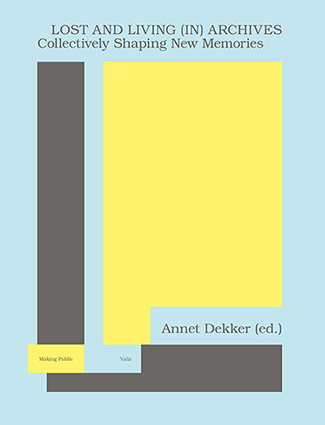Book launch | Lost and Living (in) Archives
Thursday 14 December @ Het Nieuwe Instituut, Rotteredam (NL)

Expanding on insights from the recently published reader Lost and Living (in) Archives—Collectively Shaping New Memories, this event will explore the messy entanglements of how documents are created and collected, how systems (dis)function and how networks of people, bots and algorithms trigger and demand transformations in the way archives are constructed and thought of.
What: Book launch and programme Lost and Living (in) Archives
When: Thursday 14 December, 17:00–18:30
Where: Het Nieuwe Instituut, Rotterdam
Admission: free
With: Annet Dekker, various authors of the book, students of Experimental Publishing at the Piet Zwart Institute
Archives are collections of records that are preserved for historical, cultural and evidentiary purposes. As such, archives are considered sites of a past, places that contain traces of a collective memory of a nation, a people or group. Digital archives have transformed from stable entities into flexible systems, at times referred to with the term ‘Living Archives’. In which ways has this change affected our relationship to the past? Will the erased, forgotten and neglected be redeemed, and new memories be allowed to take their place? Will the fictional versus factual mode of archiving offer the democracy that the term public domain implies, or is it merely another way for public instruments of power to operate? The various essays in Lost and Living (in) Archives show that archives are not simply a recording, a reflection, or an image of an event, but that they shape the event itself and thus influence the past, present and future.
At the book launch, students of the Experimental Publishing study path at the Piet Zwart Institute’s Media Design Master in Rotterdam will present their work, currently focusing on the topic of the autonomous archive, followed by a discussion. Particular attention will be paid to the functions and functioning of bottom-up archival approaches, community archives and autonomous archiving.
